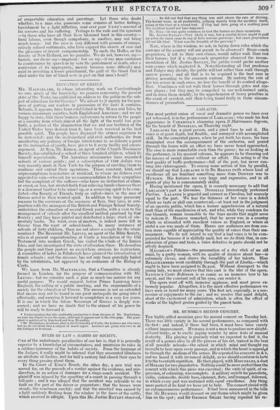RULES OF LAW w. HABITS OF SOCIETY.
ONE of the unfortunate peculiarities of our law is, that it is generally superior to a knowledge of circumstances, and maintains its rules in a sublime ignorance of the habits of society. From the language of the Judges, it really might be inferred that they accounted blindness an attribute of Justice, and for half a century had closed their eyes to every thing passing about them.
In the Court of King's Bench, the other day, a new trial was moved for, on the grounds of a verdict against the evidence, and mis- direction, in an action of damages for a stage-coach accident. The plaintiff was injured by the upsetting of a coach in passing through a toll-gate ; and it was alleged that the accident was referable to no fault on the part of the driver or proprietors ; that the horses were steady, the coachman careful ; and that the mischief was caused by a light suddenly flashing from the window in the faces of the cattle, which swerved in affright. Upon this Mr. Justice BAYLEY observed, . . . . he did not find that any thing was said about the rate of driving. The horses were, in all probability, judging merely from the accident itself, going at the time at a round trot. If they had been going at a walking pace this accident would not have happened. Mr. nim.—It was quite common to trot the horses on these occasions. Mr. Justice BAvt.sy—Very likely it was, but a careful driver ought to pull up when the coach came to any of these narrow gateways ; but coach proprietors did not likr that. What was the breadth of the gateway ?
Now, where is the wisdom, we ask, in laying down rules which the customs of the country will not permit to be observed ? Stage-coach proprietors, if left to their own choice, would rather walk than trot their horses ; but if a stage-coach proprietor observed the recom- mendation of Mr. Justice BAYLEY, the public would prefer another conveyance which neglected it. Notwithstanding all that prudence and Judges may dictate, the public will trot rather than walk through narrow passes ; and all that is to be required is the best care in driving according to the common custom. By making the rule of law too severe in such cases, we lose the benefit of its control altoge- ther. Coachmen will not walk their horses through gates and nar- row places ; but they may be compelled to use well-trained cattle, and to drive them steadily, by the apprehension of heavy penalties in the event of accident, and their being found faulty in those circum- stances of precaution.


















 Previous page
Previous page